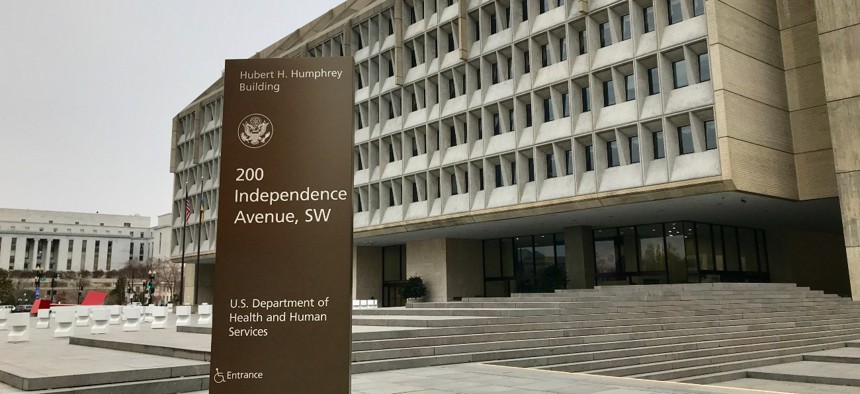
By DCStockPhotography / Shutterstock.com
HHS Seeks Feedback on Pandemic Regulatory Actions
The Trump administration is making a final push for deregulation during lame duck period.
The Health and Human Services Department is seeking feedback on how it can make permanent or modify any of the actions it took to further President Trump’s strategy to use deregulation to address the economic recession created by the novel coronavirus pandemic.
HHS posted a request for information in the Federal Register on Tuesday (which will be published formally on Wednesday) asking stakeholders to comment within 30 days on the 382 regulatory actions it took related to the pandemic. The president issued an executive order in May and the Office of Management and Budget sent a supplemental memo in August directing all federal agencies to waive or modify any regulations that could impede the economy’s recovery from the recession. Deregulation has been a major policy priority of this administration and now it’s rushing to make many rule changes during its lame duck period, as is typical of outgoing presidents.
“HHS is issuing this request for information to collect information for the purpose of considering the costs and benefits, consistent with applicable law and with protection of the public health and safety, of retaining these particular regulatory changes beyond the COVID-19 public health emergency,” said the notice. “In addition to the costs and benefits of these actions, the department seeks input on any barriers that may exist to making these deregulatory actions permanent including any evidence or experience that commenters have.”
Some of the stakeholders HHS would like to hear from include: Medicare and Medicaid beneficiaries; health care providers; advocacy groups; health insurance companies; state, local and territorial governments; long-term care facilities; pharmacists; and policy experts.
The department asked them to ponder which regulation changes HHS has made during the pandemic have been beneficial or detrimental and which should be made permanent, extended or modified at the end of the public health emergency.
In the document, HHS touted its success with expanding telehealth services, and participating in “Operation Warp Speed” to develop and distribute a coronavirus vaccine. The department also noted the Food and Drug Administration's issuing of emergency use authorizations for treatments and testing during the pandemic, all of which officials tied to regulatory rollbacks.
Susan Dudley, director of the Regulatory Studies Center at The George Washington University, who was Office of Information and Regulatory Affairs administrator from 2007 to 2009, told Government Executive on Tuesday she doesn’t believe the Trump administration has enough time to carry out the request for information since there are less than two months until Inauguration Day.
Comments will probably be due on December 28 (since 30 days from Wednesday is Christmas Day), “so HHS would only have three weeks to evaluate them and issue necessary Federal Register notices to effectuate changes,” she said. “I don’t know how many of those notices could be final actions, as opposed to proposed actions.” The Federal Register tends to get “backed up” at the end of an administration with a last minute rules push.
However, “the responses to the [request for information] may be useful to the incoming Biden administration as it considers whether to extend, make permanent, or rescind any of the public health emergency actions HHS has taken,” she said.
Amit Narang, regulatory policy advocate for the nonprofit group Public Citizen, told Government Executive he believes the department should “be focused only on the public health solutions when it comes to the COVID pandemic” and the push for deregulation is a “distraction” and “unnecessary.” The Coalition for Sensible Safeguards, whose executive committee Public Citizen co-chairs, has been keeping a running list of the Trump administration’s deregulation actions during the pandemic that group members believe are harmful.
HHS published a second, related notice in the Federal Register on Tuesday, saying that, effective immediately, all divisions of the department must ensure that new rules are not “redundant, overlapping or inconsistent.”
Dudley said this is just a “policy document” that she does not believe is binding.
Narang told Government Executive it’s “short and vague” and does not have much explanation to support it. He expects President-elect Joe Biden to repeal it.
In reference to the two new documents together, Narang said “This looks like a pattern from HHS; trying to lock in policies at the last minute.” He also referenced an upcoming final rule from the Centers for Medicare and Medicaid Services, a division of HHS, that has a unique disclaimer acknowledging the “tight time constraints” in the process.
Also on November 4, HHS launched an “unprecedented” push for regulatory review by issuing a proposed rule that would require certain regulations to be reviewed every 10 years to see if they’re still needed.
Regulation experts previously told Government Executive they expect the Biden administration to immediately begin reversing the Trump administration’s deregulatory agenda after Inauguration. However, undoing any last minute regulations (using the Congressional Review Act) could be difficult if there is a divided Congress and reversing deregulations will depend on the specifics of the regulation and any potential for litigation.







